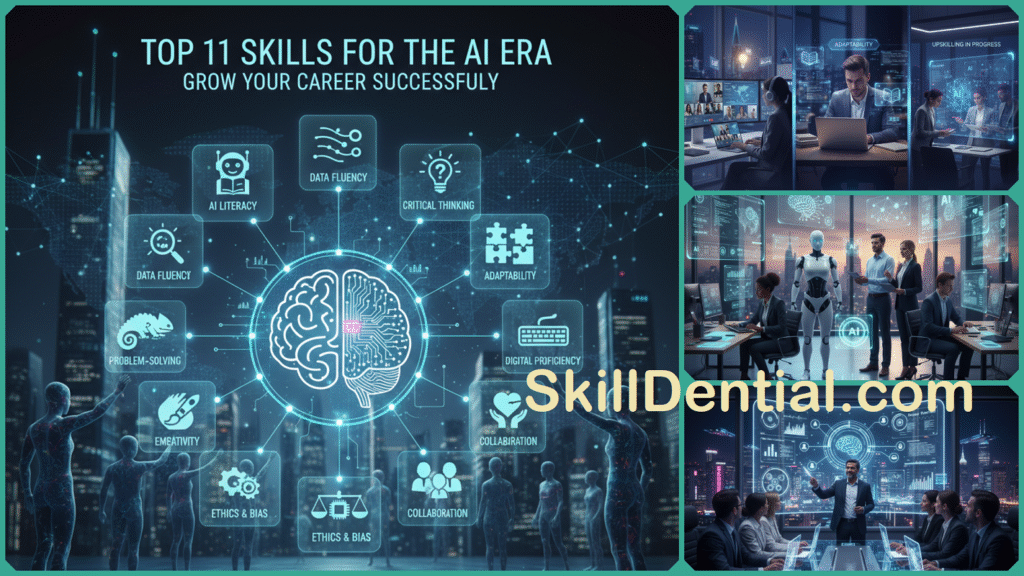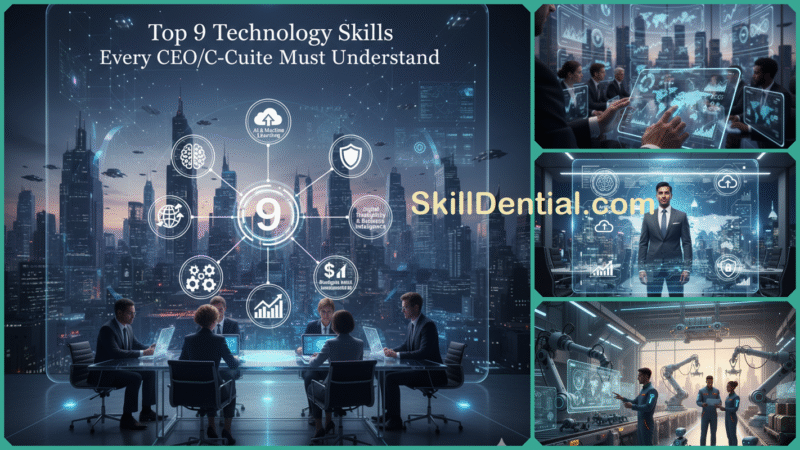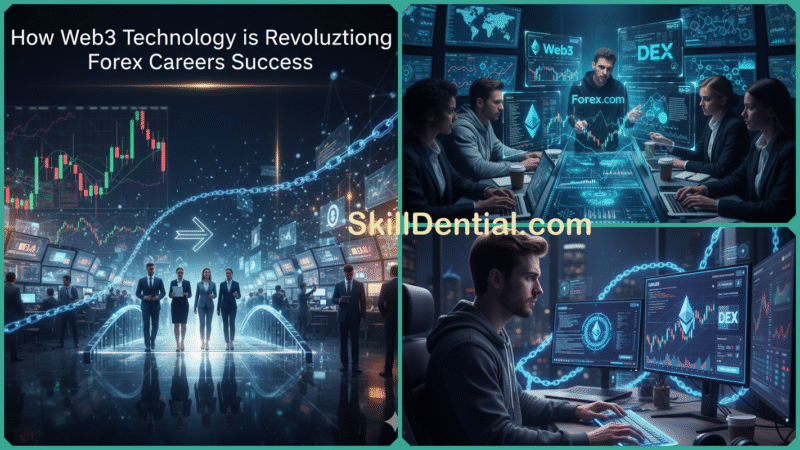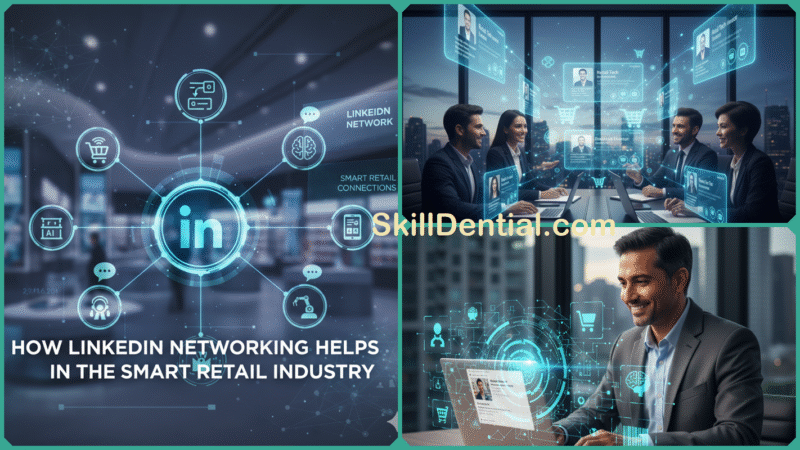Top 11 Skills to Grow Your Career Successfully in the AI Era
Artificial intelligence (AI) is rapidly transforming a wide range of industries and significantly reshaping job roles at an unprecedented pace in today’s fast-evolving and dynamic workplace environment. While this technological advancement generates excitement and optimism about groundbreaking innovation and new possibilities, it simultaneously raises concerns and uncertainty among many professionals regarding their future job security and long-term career growth prospects.
Whether you are a mid-career professional seeking to advance, a recent graduate entering the workforce, a career changer exploring new opportunities, a team leader managing diverse groups, or a lifelong learner committed to continuous growth, understanding the key skills necessary to thrive in this rapidly evolving, AI-driven era is crucial. Developing these skills will enable you not just to survive the challenges of today’s dynamic job market but to excel and truly prosper in your chosen field.

This blog post delves deeply into the top 11 essential skills you need to confidently and effectively grow your career in today’s rapidly evolving age of artificial intelligence. These crucial skills encompass a broad range of areas, including advanced technical expertise, uniquely human traits that machines struggle to mimic, and flexible, adaptable mindsets essential for thriving alongside AI technologies.
Additionally, the post provides practical, actionable advice on how to cultivate and strengthen each of these skills, supported by the latest cutting-edge research findings and insightful real-world examples from various industries.
Why These Skills Matter in the AI Era
The reason these skills matter so much in the AI era is that artificial intelligence excels primarily at automating repetitive, routine, and data-intensive tasks. While AI systems are powerful in processing large volumes of information quickly and performing specific functions, they inherently lack the capacity to innovate, empathize, navigate social complexities, or manage strategic challenges in the way humans do.
This creates a complementary relationship where human professionals who develop and leverage skills such as critical thinking, creativity, emotional intelligence, and leadership become indispensable. Employers increasingly recognize that these human-centric skills cannot be replicated by AI and are essential for interpreting AI insights, making judgment calls, and driving innovation.
For instance, in complex problem-solving where ambiguity and ethical considerations arise, human cognition and empathy are crucial to align AI outputs with organizational goals and societal values. Moreover, emotional intelligence is vital in managing relationships, inspiring teams, and addressing the human factors during AI adoption and change management.
Developing these uniquely human skills allows professionals to work alongside AI technologies effectively, turning what might be perceived as a threat—job displacement—into an opportunity for career growth and business success.
It shifts the narrative from fearing automation to embracing human-AI collaboration, which fosters adaptability, resilience, and innovation in the workplace. In essence, cultivating these skills future-proofs careers by enabling individuals to complement AI’s strengths with irreplaceable human qualities that drive strategic and interpersonal excellence.
Key Concepts and Frameworks
Two fundamental and essential concepts form the foundation for truly understanding what it takes to successfully grow and develop a thriving career in the rapidly evolving AI era:
Human-AI Collaboration
The future workplace centers on humans collaborating effectively with AI systems. AI excels at automating routine, repetitive, and data-heavy tasks, freeing humans to focus on higher-value work requiring judgment, creativity, and interpersonal skills.
This symbiotic relationship enhances productivity and decision-making—AI provides data-driven insights at machine speed, while humans add context, ethics, empathy, and strategic vision. For example, in customer service, AI chatbots handle basic queries 24/7, allowing human employees to resolve complex issues and build customer relationships.
Collaboration leads to better, faster decisions and unleashes human creativity and innovation that AI alone cannot replicate. It shifts human roles from task-doers to overseers, innovators, and orchestrators of intelligent systems, ensuring career growth through unique human contributions alongside AI.
Lifelong Learning and Adaptability
The rapid pace of technological change and AI advancement means that no career skill remains static. Lifelong learning — a mindset committed to continual upskilling and reskilling — is the single most important attribute for long-term career success. Adaptability allows professionals to embrace new tools and roles as they emerge, quickly pivot when industries transform, and remain valuable contributors.
This mindset supports developing all other essential skills by fostering curiosity, resilience, and openness to change. Workers who invest in ongoing education through micro-courses, workshops, or self-study stay ahead of skill obsolescence and position themselves as proactive leaders in an AI-augmented labor market.
Top Skills to Protect and Grow Your Career
The Top 11 Skills to Protect and Grow Your Career in the AI Era align closely with the human-centric capabilities that experts and industry leaders identify as essential for future-proofing careers in a landscape dominated by AI and automation.
These skills emphasize irreplaceable qualities that AI cannot replicate fully, along with technical fluency to collaborate effectively with AI systems. Below is an authoritative synthesis of each skill with advice on how to develop it, supported by current industry insights.
Critical Thinking and Problem Solving
AI excels at recognizing patterns and processing large volumes of data quickly and accurately, but it cannot exercise nuanced judgment or understand subtle contextual factors. Critical thinking, on the other hand, empowers professionals to carefully analyze ambiguous or complex situations and make informed, strategic decisions based on a broader range of considerations.
For instance, healthcare workers rely on critical thinking skills to interpret AI-generated diagnostic suggestions while also taking into account the unique context and individual circumstances of each patient to provide the best possible care.
- Develop By: Actively engaging in a variety of challenging puzzles, participating in strategic and tactical games, exploring detailed scenario planning, and consistently practicing reflective thinking exercises to enhance cognitive abilities and problem-solving skills.
Emotional Intelligence (EQ) and Social Awareness
Human empathy and social skills play an absolutely crucial role in building genuine trust, effectively influencing others, and successfully navigating the often complex dynamics of the workplace—these are areas where artificial intelligence simply cannot authentically replicate or replace human abilities.
True leadership and meaningful customer engagement fundamentally depend on these deeply emotional capacities and genuine interpersonal connections that only humans, with their unique empathy and understanding, can truly provide and nurture.
- Develop By: Actively seeking interpersonal feedback from colleagues and friends, consistently practicing active listening techniques during conversations, and thoroughly studying well-established emotional intelligence frameworks such as the Daniel Goleman comprehensive model to enhance understanding and application.
Adaptability and Growth Mindset
The AI era demands remarkable agility and adaptability from all professionals. In this rapidly changing landscape, individuals must continually engage in learning and be ready to pivot to new roles or acquire new skills as emerging technologies evolve and reshape industries.
Cultivating a strong growth mindset is essential because it fosters resilience, encourages proactive skill acquisition, and helps professionals stay ahead in their careers.
- Develop By: Consistently keeping updated with the latest industry trends and technological advancements, adopting lifelong learning habits that promote continuous personal and professional development, and welcoming challenges as valuable opportunities for growth and improvement.
Creativity and Innovation
While AI is capable of generating content efficiently, it is the uniquely human ability to think creatively and craft compelling stories that truly drives innovation and fosters deep emotional connections—something that technology alone, no matter how advanced, cannot fully replicate or achieve.
- Develop By: Engaging in open brainstorming sessions without restrictions, actively pursuing a variety of creative hobbies, and collaborating with diverse groups of people from different backgrounds to inspire and generate novel, innovative ideas.
Digital Fluency and AI Literacy
Gaining a deep understanding of AI’s capabilities and its inherent limitations is essential for fostering effective collaboration between humans and machines. By developing a solid foundation in basic programming skills, improving data literacy, and becoming well-acquainted with various AI tools and technologies, individuals can significantly boost their productivity and drive greater innovation in their work and projects.
This comprehensive knowledge significantly empowers users to leverage AI technologies more effectively and responsibly in a wide range of applications and scenarios. It provides them with a deeper understanding and practical insights that enable smarter decision-making and ethical use of artificial intelligence tools in their daily activities.
- Developed By: Actively completing a variety of online foundational courses focused on artificial intelligence, engaging in hands-on experimentation with diverse AI applications to gain practical experience, and acquiring proficiency in essential programming languages such as Python to build and implement AI models effectively.
Complex Problem-Solving and Systems Thinking
Recognizing the intricate interrelations within complex systems enables professionals to develop multifaceted and comprehensive solutions that cannot be fully addressed by AI-generated forecasts alone. By gaining a deep understanding of these interconnected elements, individuals are better equipped to approach problems with a much broader perspective.
This enhanced viewpoint enables them to develop well-rounded strategies that take into account a wide range of influencing factors all at once, rather than in isolation. Such an approach allows for more effective problem-solving and decision-making processes that address the complexities of real-world situations in a thoughtful and integrated manner.
- Develop By: Immersing oneself in systems-thinking methodologies, thoroughly analyzing organizational challenges from multiple angles, and actively participating in interdisciplinary projects that foster collaboration and innovative problem-solving approaches.
Leadership and Influence
Guiding teams through the complex process of AI-driven transformation requires not only technical knowledge but also a deep sense of empathy, a clear and forward-thinking strategic vision, and a strong commitment to ethical decision-making.
Leaders who take on the role of coaches and mentors, inspiring their teams to embrace change and adaptability, are able to cultivate organizations that are resilient and capable of thriving in rapidly evolving environments.
- Develop By: Actively enrolling in comprehensive leadership development programs, providing ongoing mentorship to peers and team members, and consistently emphasizing the importance of ethical AI use in every aspect of decision-making and implementation.
Data Literacy and Analytical Skills
With the rapid advancement of AI technology generating vast volumes of data every day, having strong competence in data interpretation and validation becomes essential for making well-informed decisions and ensuring rigorous quality control throughout processes.
- Develop By: Utilizing powerful learning tools such as Excel, Tableau, and Power BI, gaining a solid understanding of statistical methods, and actively participating in data-driven projects and initiatives to enhance practical experience and analytical skills.
Communication Skills
Translating complex AI analysis into clear, compelling narratives serves as a crucial bridge between technical insights and stakeholder understanding, playing an essential role in fostering effective collaboration and managing organizational change.
This important skill guarantees that the valuable and insightful information generated by AI technologies is not only accessible but also easily understandable and actionable for a wide range of diverse audiences.
By making complex AI data more user-friendly, it significantly improves decision-making processes across various sectors and helps drive meaningful, impactful outcomes that can benefit organizations and individuals alike.
- Develop By: Regularly practicing storytelling techniques, honing public speaking abilities, and refining writing skills; actively seeking constructive communication feedback and thoughtfully applying it to improve clarity and engagement.
Cybersecurity Awareness
As the use of AI technology continues to expand rapidly across various industries, the complexity and frequency of sophisticated cyber threats also increase significantly. A strong understanding of cybersecurity principles is essential to protect sensitive data effectively and to uphold the trust that organizations have built with their clients and stakeholders.
- Develop By: Continuously staying informed about the latest cybersecurity protocols and best practices, actively pursuing relevant professional certifications, and promoting the secure and responsible deployment of AI systems to minimize potential vulnerabilities.
Technological Agility and Automation Management
Beyond possessing basic AI knowledge, effectively managing and optimizing automation tools significantly enhances overall operational efficiency and drives innovation within an organization. This valuable skill acts as a crucial bridge that connects broader business strategy with practical AI solutions, ensuring that technology supports and advances company objectives in meaningful ways.
- Develop By: Gaining extensive hands-on experience with various automation software platforms, actively participating in specialized technology workshops and training sessions, and strategically aligning AI tools with the specific goals and priorities of the organization to maximize impact and value.
These 11 skills together strike a harmonious balance between essential human qualities and advanced technical expertise, forming a strong and comprehensive foundation for sustained career growth and success in a workplace increasingly enhanced by artificial intelligence.
By actively cultivating and developing these skills, professionals position themselves as invaluable and indispensable contributors who effectively leverage the powerful capabilities of AI while simultaneously providing the irreplaceable and uniquely human value that technology alone cannot replicate.
Summary of the Top Skills to Protect and Grow Your Career
Here is a comprehensive and detailed summary of the Top 11 Essential Skills to Protect and Grow Your Career in the rapidly evolving AI Era, thoughtfully reflecting expert consensus as well as the latest groundbreaking research on sustainable career growth and success in an increasingly AI-driven professional world:
| SKill | Why It Matters | How to Develop |
|---|---|---|
| Critical Thinking and Problem Solving | AI predicts but lacks nuanced judgment. Human critical thinking drives strategic decisions. | Engage in puzzles, strategic games, scenario planning, and reflective thinking exercises. |
| Emotional Intelligence (EQ) and Social Awareness | Agility enables continuous learning and resilience amid fast technological change. | Stay updated on trends, embrace lifelong learning, view challenges as growth opportunities. |
| Adaptability and Growth Mindset | Agility enables continuous learning and resilience amid fast technological change. | Stay updated on trends, embrace lifelong learning, view challenges as growth opportunities. |
| Creativity and Innovation | Human originality creates emotional connection and drives new business models. | Brainstorm freely, pursue creative hobbies, collaborate diversely. |
| Digital Fluency and AI Literacy | Knowing AI tools and basics allows effective collaboration and productivity. | Take AI courses, experiment with tools, learn programming basics like Python. |
| Complex Problem-Solving and Systems Thinking | Holistic thinking enables multifaceted solutions beyond AI forecasting. | Study systems thinking, analyze organizational interconnections, join cross-functional projects. |
| Leadership and Influence | Empathetic, ethical leadership steers teams through AI-driven transformation. | Attend leadership programs, mentor peers, focus on ethical AI use. |
| Data Literacy and Analytical Skills | Interpreting and validating data guides sound decisions and quality control. | Learn Excel, Tableau, Power BI, statistics basics, engage in data projects. |
| Communication Skills | Clear storytelling translates AI insights to inspire and engage stakeholders. | Practice storytelling, public speaking, writing, seek feedback. |
| Cybersecurity Awareness | Protecting data and systems is crucial as cyber threats escalate with AI use. | Stay informed on cybersecurity, earn related certifications, promote secure AI practices. |
| Technological Agility and Automation Management | Managing automation tools boosts efficiency and aligns AI with business needs. | Gain hands-on automation experience, join tech workshops, align tools with goals. |
Developing these skills creates a balanced combination of uniquely human abilities and essential technical fluency, empowering you to not only adapt but also to thrive and confidently grow your career alongside the rapid advancements of AI in virtually any industry or professional field.
This innovative approach effectively transforms artificial intelligence from being perceived merely as a potential threat into a tremendous opportunity for driving innovation, showcasing leadership, and making a meaningful and lasting contribution to various fields.
Current Trends Supporting Career Growth in AI Era
Current trends supporting career growth in the AI era highlight a rapidly evolving and dynamic landscape that is being shaped by a continuous increase in investments in artificial intelligence technologies, the ongoing evolution of essential workplace skills, and significant shifts in traditional work models.
These factors together are creating new opportunities and challenges that define the future of careers in this transformative period.
Increasing Investment in AI
In 2025, AI investment remains robust across industries, with a clear focus on practical AI applications that drive business value and profitability. Major tech companies and investors are prioritizing AI-enabled products and services that directly impact end customers and enterprise efficiency.
For example, Microsoft, Alphabet, Amazon, and Meta plan to spend a combined $320 billion on AI technologies and infrastructure in 2025, up significantly from prior years. This continued flow of capital fuels innovation, expands AI integration, and creates sustained demand for AI literacy and digital skills in the workforce.
Prioritization of Soft Skills
Despite automation, soft skills such as emotional intelligence and adaptability are increasingly recognized as critical differentiators. As AI handles routine functions, human roles focus more on complex problem-solving, collaboration, leadership, and emotional awareness — skills that machines cannot replicate.
Organizations are therefore increasingly emphasizing these crucial human-centric traits to maintain a strong competitive edge in their respective industries while simultaneously fostering more effective and seamless collaboration between humans and AI systems.
Remote and Hybrid Work Models
The rise of remote and hybrid work environments in the AI era intensifies the need for strong digital communication, collaboration, and self-management skills. Professionals must leverage digital tools to collaborate seamlessly across distributed teams while maintaining productivity and engagement.
This emerging trend strongly reinforces the importance of digital fluency and advanced communication competency as essential skills for sustained career growth and professional development in today’s rapidly evolving job market.
Lifelong Learning Institutionalization
Employers are increasingly embedding lifelong learning and upskilling programs into organizational culture as a strategic response to rapid technological change. This institutionalization includes access to micro-courses, certifications, and training initiatives that empower employees to continuously update their skills, adapt to AI innovations, and future-proof their careers.
This significant shift also plays a crucial role in reducing and alleviating workforce anxiety that often arises due to AI-driven transformations by offering employees clear, well-defined paths for continuous skill development and meaningful career advancement opportunities.
Together, these trends emphasize that growing a career in the AI era requires a blend of technical acumen, human skills, and an adaptable lifelong learning mindset aligned with an evolving technology landscape.
FAQs
Will AI replace my job?
AI will automate many routine and repetitive tasks, but it cannot fully replace uniquely human skills like empathy, strategic thinking, creativity, and complex problem-solving. While up to 300 million jobs globally could be transformed or displaced by AI by 2030, many roles will evolve rather than vanish. Continuous upskilling in human-centric skills and AI literacy protects and enhances job security amid these changes.
How can I start learning AI skills with no technical background?
Begin with accessible, beginner-friendly courses on platforms such as Coursera, LinkedIn Learning, or Simplilearn. These platforms offer AI fundamentals, practical applications, and non-technical introductions to data literacy and AI concepts, helping build a solid foundation for further specialization.
What’s the best way to build emotional intelligence for career growth?
Practice self-awareness by reflecting on your emotions and behaviors, actively listen to colleagues, and seek constructive feedback regularly. Participating in teamwork and leadership opportunities helps develop empathy and social skills crucial for effective collaboration and influence.
Are technical skills more important than soft skills in the AI era?
Both are equally critical for career success. Technical skills enable working effectively with AI tools and digital systems, while soft skills like critical thinking and communication ensure you add meaningful value beyond automation. Cultivating a balance of both creates a competitive edge.
How often should I update my skills?
Continuous learning is essential. It is advisable to reassess your skill set every 6 to 12 months, keeping pace with market demands, technological shifts, and industry trends. Regular upskilling or reskilling ensures career resilience in the fast-evolving AI landscape.
In Conclusion
Growing your career in the AI era means blending technical proficiency with human-centric skills and an adaptable mindset. The 11 skills outlined here—ranging from critical thinking to AI literacy and emotional intelligence—form a resilient foundation for career security and advancement.
Begin your journey today by selecting one or two specific areas to concentrate on, utilizing a variety of online resources to deepen your knowledge, and consistently staying engaged with the latest developments and trends within the industry. This focused approach will help you build expertise effectively while keeping you informed and adaptable in a rapidly evolving field.
This proactive approach effectively transforms any anxiety or uncertainty about artificial intelligence into a strong sense of confidence and numerous opportunities, thereby empowering every professional to not only adapt but truly thrive in an increasingly AI-augmented future that is rapidly evolving.




